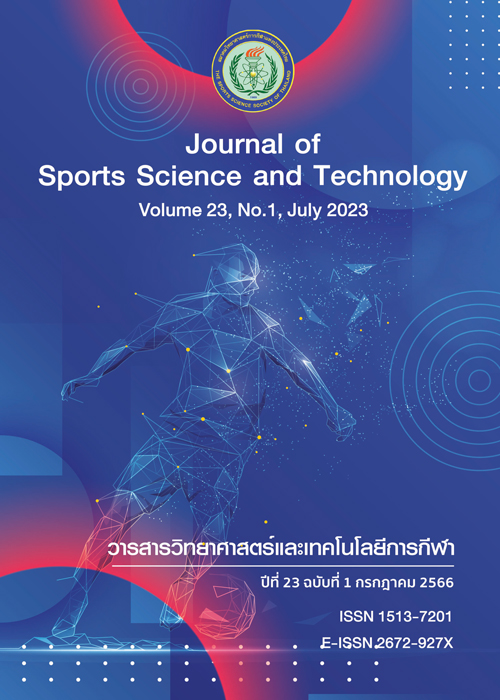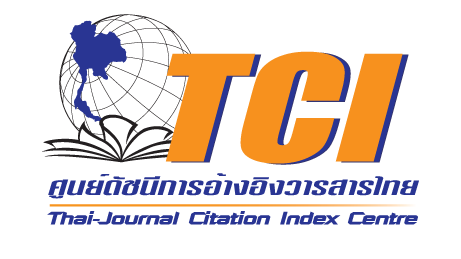TRANSLATION AND VALIDATION OF THE THAI VERSION OF THE ATHLETIC MENTAL ENERGY SCALE (AMES-T)
DOI:
https://doi.org/10.14456/jsst.2023.3Keywords:
Mental energy, psychology of sport excellence, cross-cultural validation, peak performanceAbstract
This study aimed to translate and to validate the Athletic Mental Energy Scale (AMES) into Thai version. In study 1, we investigated the content validity by inviting 15 participants (sport/language experts=5; athletes=10) to examine the appropriateness of the content of a translated AMES-Thai. In study 2, the sample included 572 Thai student-athletes from University teams in Thailand (62.8% men and 37.2% women) who participate in various sports, both individual and team, and have a mean age of 19.7 years. Moreover, we examined the factorial structure and reliability of the AMES-Thai using confirmatory factor analysis (CFA) and reliability analysis. In study 3, the sample included 442 Thai student-athletes from university teams in Thailand; we investigated the convergent and discriminant validity via correlations among the AMES-Thai and athletes’ stress, positive state of mind, and burnout. AMES-Thai had a moderate-to-high positive correlation with athletic mentality, reflecting the convergence validity of the Thai version of the AMES as having factors from the same structure as the original version. Results showed that the 6-factor, 18-item AMES-Thai had adequate validity and reliability. We recommend that Thai scholars and sports professionals use the AMES-Thai for future research and practice.
(Journal of Sports Science and Technology 2023; 23(1): 36-51)
(Received: 17 August 2022, Revised: 20 December 2022, Accepted: 9 January 2023)
Keywords: Mental Energy/ Psychology of Sport Excellence/ Cross-Cultural Validation/ Peak Performance
* Corresponding author: Chatkamon SINGNOY
Faculty of Sport Science, Burapha University Chon Buri, THAILAND
E-mail: chatkamon@gmail.com
References
Issurin, V.B. New Horizons for the Methodology and Physiology of Training Periodization. Sports Medicine, 40 (3), 189-206. DOI: 10.2165/11319770-000000000-00000. 2010.
Zakrajsek, RA., Raabe, J., & Blanton, JE. Psychological characteristics of elite athletes. In M. H. Anshel, T. A. Petrie, & J. A. Steinfeldt (Eds.), APA handbooks in psychology series. APA handbook of sport and exercise psychology, Vol. 1. Sport psychology (p. 129–148). American Psychological Association. DOI:10.1037/0000123-008. 2019.
Anderson, R., Hanrahan, SL., and Mallett, CJ. Investigating the optimal psychological state for peak performance in Australian elite athletes. Journal of Applied Sport Psychology, 26, 318–333. DOI: 10.1080/10413200.2014.885915. 2014.
Lu, FJH., Gill, DL., Yang, CMC, et al. Measuring athletic mental energy (AME): instrument development and validation. Frontier in psychology, 9, 1-15. DOI: 10.3389/fpsyg.2018.02363. 2018.
Williams, JM. Psychological characteristics of peak performance. In JM. Williams & V. Krane (Eds.), Applied Sport Psychology: Personal Growth to Peak Performance (pp.207-227). New York: McGraw Hill. 2015.
Loehr, JE. Leadership: Full engagement for success. In S. Murphy (Ed.), The Sport Psychology Handbook (pp. 157-158). Champaign IL: Human Kinetics. 2005.
Morgan, WP. Prediction of performance in athletics. In P. Klavora & JV. Daniel (Eds.), Coach, Athlete, and the sport psychologist (pp.173-186). Champaign IL: Human Kinetics. 1979.
Morgan, WP. The trait psychology controversy. Research Quarterly for Exercise and Sport, 51,50-76. DOI: /10.1080/02701367.1980.10609275. 1980.
Ravizz, K. Peak experience in sport. Journal of Humanistic Psychology, 17, 35-40. 1977.
Roberts, GC. Understanding the dynamics of motivation in physical activity: The influence of achievement goals and motivational processes. In G. C. (Ed.), Advances in motivation in sport and exercise, Champaign, IL: Human Kinetics. 2012.
Feltz, D., Short, S., & Sullivan, S. Self-efficacy in sport: Research and strategies for working with athletes, teams, and coaches. Champaign IL: Human Kinetics. 2008.
Vealey, R., & Chase, M. Self-confidence in sport: Conceptual and research advances. In T. Horn (Ed.), Advances in sport psychology. Champaign, IL: Human Kinetics. 2008.
Wikipedia Thailand at the Olympics. Retrieved from https://en.wikipedia.org/wiki/Thailand_at_the_Olympics#Medals_by_Winter_Sport. 2020.
Cohen, RJ., & Swerdlik, ME. Psychological Testing and Assessment: Introduction to Tests and Measurement (9th Edition). New York: McGraw Hill Education. 2018.
Jones, PS., Lee, JW., Phillips, LR., Zhang, XE., Jaceldo, KB. An Adaptation of Brislin’s Translation Model for Cross-cultural Research, Nursing Research, 50 (5), 300-304. 2001.
Bentler, PM., & Wu, E. EQS 6 for Windows user’s guide. Encino, CA: Multivariate Software. 2002.
Tabachnick, BG., & Fidell, LS. Using multivariate statistics (4th ed.). Boston, MA: Allyn & Bacon. 2007.
Singhnoy, C. & Vonjaturapat, V. The causal relationship of factors affecting in athletic burnout: validation the Athlete Burnout Questionnaire (ABQ). Journal of Sport Science and Technology, 9(1-2): 241-258. 2009.
Chang, YC., & Lu, FJH. The development of Athletic Positive States of Mind Scale (APSMS): Reliability and validity. Bulletin of Sport and Exercise Psychology of Taiwan, 1, 71-80. (in Chinese). 2002.
Lu, FJH., Hsu, YW., Chan, YS., Cheen, JR., & Kao, KT. Assessing college student-athletes' life stress: Initial measurement development and validation. Measurement in Physical Education and Exercise Science, 16(4), 254-267. 2012.
Chiu, S. S., Hsu, Y. W., Chiu, Y. H., Chou, C.C., Gill, D. L., & Lu, F.J.H. Seeking Positive Strengths in Buffering Athletes’ Life Stress-Burnout Relationship: The Moderating Roles of Athletic Mental Energy. Frontiers in Psychology, 10, 1-12. DOI: 10.3389/fpsyg.2019.03007. 2020.
Horowitz, M., Alder, N., & Kegeles, SA .Scale for measuring the occurrence of positive state of mind: A preliminary report. Psychosomatic Medicine, 50, 477-483. DOI:10.1097/00006842-198809000-00004. 1988.
Sun, T., Horn, M., & Merritt, D. Values and life styles of individualists and collectivists: a study on Chinese, Japanese, British, and US consumers. Journal of Consumer Marketing. 21 (5), 318-331. 2004.
Markus, H.R., & Kitayama, S. “Culture and the self: implications for cognition, emotion, and motivation”, Psychological Review 98 (2), 224-253. 1991.
Sirisawasd, P., Chaiear, N., Johns, N., & Khiewyoo, J. Validation of the Thai Version of a Work-related Quality of Life Scale in the Nursing Profession. Safety and Health at Work, 5, 80-85. DOI: 10.1016/j.shaw.2014.02.002. 2014.
Tongprasert, S., Rapipong, J., & Buntragulpoontawee, M. The cross-cultural adaptation of the DASH questionnaire in Thai (DASH-TH). Journal of Hand Therapy, 27, 49-54. DOI: 10.1016/j.jht.2013.08.020. 2014.
Murphy, K. R., & Davidshofer, C. O. Psychological testing: principles and applications (6th ed.). Upper Saddle River, N.J.: Pearson/Prentice Hall. 2009.







